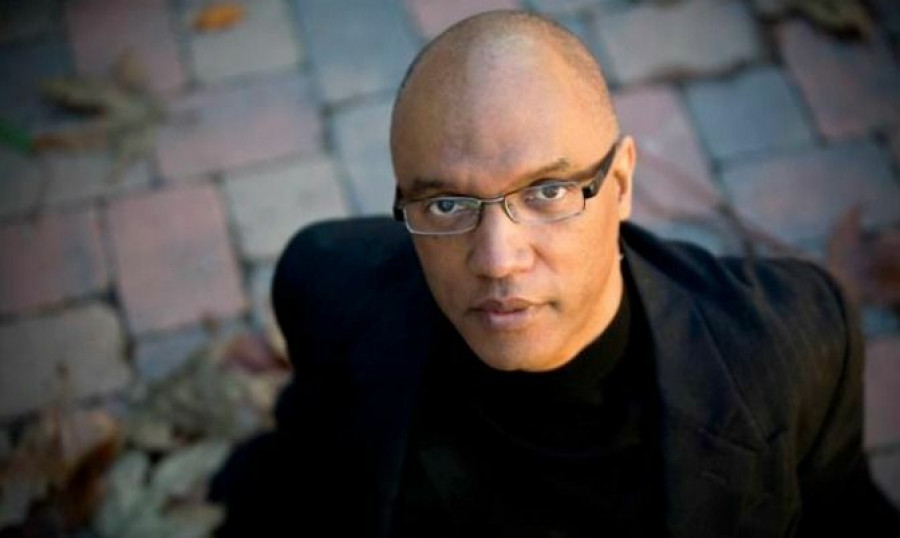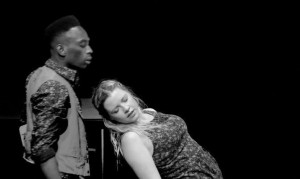Childs grew up around music, during the 60s and 70s. Both his older sisters Joy and Kristin were instrumental in exposing Childs to the many different musical genres of the period. They would listen to Motown, the Beatles and James Brown.
“They were both into Jazz but Joy was into Jazz a lot,” he said.
Kristin on the other hand, was into folk music of the day such as Joel Mitchell and James Taylor. Kristin who Childs was very close to artistically would sit with him and read books, invent games and tease each other.
“She had a great influence on me in terms of my artistic thinking, how I thought about being creative. Things were like a game with her.”
Lucy Oneka is a playwright and journalist. She has covered many stories for Toronto based newspapers such as the East York Observer, the Scarborough Observer, and the Toronto Observer. Lucy’s other passion is music. She is a two time semi-finalist of the prestigious UK Song Writing Contest and recently released her own debut gospel album, “You Are Faithful”.
Childs did not know it then, but the fundamentals for his musical career were being laid. It wasn’t until Childs’ parents who were both school teachers in L.A. sent him to a private school, that he would discover his vocation.
“They sent me to a boarding school for boys called Midland,” he said. Midland was a secluded school on a cattle ranch and ranked among the highest academically. It was a rugged place where students used survival skills such as building their own fires to get heat, and to have a hot shower.
“The philosophy was the students ran the school,” he said. It was there that Childs heard for the first time, Emerson Lincoln Palmer, which struck a chord with him. As a student, he found the country life boring and immersed himself in music. He discovered a piano in a little classroom and began playing it.
“I glued myself to the piano and played it for eight hours straight, all day, every day, every spare minute,” he said. However, he would not take music seriously until the age of fourteen and began playing professionally as a teenager. Years later, Childs, now at the pinnacle of his career says he never focused on making it ‘big’ but on just doing what he loved.
“When you truly love something you’re doing, you don’t think of it in those terms, like how far am I going to get,” he says. “You just do it because you love it and then all of a sudden you end up where you are.”
Childs’ success hasn’t come without hard work. He is his own biggest competitor and is always trying to do something better than he did before.
“If there was something that I couldn’t get on the piano, I would just practice it and practice it until I got it,” he said. “But I understood that in order to be the best at something, you have to be the best that you could be. I kind of had an innate understanding of that,” he said.
Childs points to a good home as the foundation for his success. “I had a very supportive and loving upbringing, which I can’t stress enough how that helped,” he said.
He also acknowledges that without the approval and support of his parents in his career choice, his success would not be possible.
“It is important for parents to validate what their children want to be in life, only if it is something good,” he said.
People who have also influenced Childs are his friends, and his next door neighbour Leon Bisquera, who taught him certain tunes from legends such as Herbie Hancock. “I had a lot of support from a lot of people,” he said. “I have the faith and the trust of very good people on my side working with me; my agent, the record company that allowed me to do my last record, the musicians who are interested enough in my music to play it with me. I am very lucky to have those things in place in my life.”
The power of a strong support network at home did not only help him fulfill his musical career but also helped him overcome obstacles such as racism.
“As a Black person in America, it is hard to avoid the spectre of race. Racism, and exploiting one race for industrial advantage or gain is pretty much the history of the United States. It is kind of woven into the fabric of this country,” he said. “So, yeah, you are going to experience racism. I have experienced it on numerous occasions.”
Childs points to an event that happened in Midland where he experienced both hatred and acceptance. "I was the only black person there. And so, one guy thought that it would be funny to make a joke that had the word n----r in it,” he said. “A white friend of mine was sitting with me and we both jumped the guy.”
In the face of negativity, he says you have to continue to believe in your self-worth. “I am not saying that I wouldn’t have, had I been raised in a different situation, had trouble believing in my self-worth but I had great parents and a great family situation,” he said.
It is because he has seen the value of strong support that Childs puts great emphasis on mentorship. He says it is everything to have a mentor or someone to look up to, especially if they don’t have a good family home.
“It is becoming more and more fixed in my conscience as I as get older,” he said. “I think the act of passing something down, some sort of timeless knowledge is really important. I know from having kids that a young kid learns more from what you do rather than what you say.”
If an authority figure who is around is a good, positive influence, it’s going to affect a younger kid and inspire the kid to do the things that the authority figure is doing. If the authority figure on the other hand is destructive and or violent, then the kid is going to take that cue as a behavioural norm. So, it is important to have positive mentors.
“I think it’s the key… to the survival to our humanity,” he said.

 By
By 





